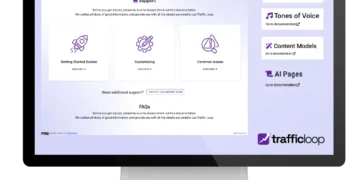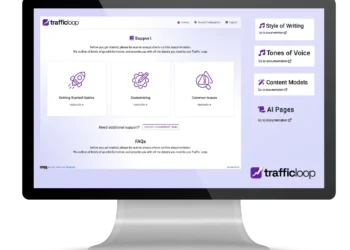In the world of technology, artificial intelligence (AI) is emerging as a revolutionary force, ready to radically transform how we interact with the web. Advanced AI-based search tools, such as ChatGPT, are challenging the dominance of industry giants like Google, signaling potential changes in information access and digital marketing strategies.
At the heart of AI search engine innovation is the promise of making online information searches faster and more efficient. These tools allow users to obtain immediate and contextualized responses, surpassing the traditional approach based on long lists of links. The ability to interact directly with a chatbot that understands and responds naturally could drastically reduce the time spent searching for relevant data, revolutionizing the user experience.

Google, the undisputed leader in online searches, might see its business model threatened by the rise of AI search engines. Google’s model, heavily reliant on advertising revenue from search results, could be compromised if users begin to prefer AI-based search tools. A decline in traffic to Google could lead to a significant reduction in advertising profits, pushing the company to rethink its monetization strategies.
One of the main concerns related to AI search engines involves transparency and potential bias. The criteria by which these systems filter and present information often remain opaque, raising doubts about the completeness and impartiality of the results provided. It is essential for developers to ensure their algorithms are free from bias and transparent to users, maintaining public trust and ensuring the integrity of information.
The rise of AI search engines is redefining the field of Search Engine Optimization (SEO). In the future, SEO may need to consider how content is interpreted and valued by AI rather than optimizing for specific keywords. Simultaneously, advertising strategies may evolve toward greater integration with AI systems, leveraging behavioral data to target ads more effectively. This could lead to a new way of conceiving and implementing digital marketing campaigns.
The advent of AI search engines could mark the beginning of a new era for online search, with significant implications for businesses and digital marketing professionals. SEO strategies will need to adapt to be more “readable” to AI, and the very concept of online interaction may undergo a radical transformation. Companies will need to remain agile and innovative, embracing new technologies and approaches to maintain their competitiveness.
While AI promises to make web browsing more direct and personalized, challenges such as privacy risks, data security, and information fidelity remain. It will be crucial to closely monitor the evolution of these technologies and find a balance that maximizes benefits without sacrificing fundamental rights and transparency. The tech community and users must collaborate to ensure the adoption of AI search engines occurs ethically and sustainably, paving the way for an innovative and inclusive digital future.
For ThePatent, I am Giovanni Sapere director of magazine, exploring the frontiers of innovation and outlining the changes that are reshaping our digital world.
PH: ortmoragency

































